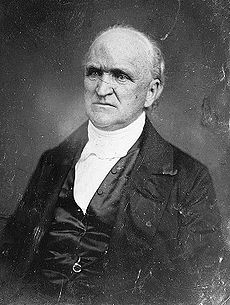
Samuel Hanson Cox
Encyclopedia

United States
The United States of America is a federal constitutional republic comprising fifty states and a federal district...
Presbyterian minister and a leading abolitionist.
Cox was born in Rahway, New Jersey
Rahway, New Jersey
Rahway is a city in southern Union County, New Jersey, United States. It is part of the New York metropolitan area, being 15 miles southwest of Manhattan and five miles west of Staten Island...
, of Quaker
Religious Society of Friends
The Religious Society of Friends, or Friends Church, is a Christian movement which stresses the doctrine of the priesthood of all believers. Members are known as Friends, or popularly as Quakers. It is made of independent organisations, which have split from one another due to doctrinal differences...
stock. After renouncing his religion and serving in the War of 1812, he studied law before entering the ministry He was pastor of the Presbyterian church at Mendham, New Jersey
Mendham, New Jersey
Mendham is a borough in Morris County, New Jersey, in the United States. As of the 2000 Census, the borough population was 5,097.While New Jersey was an English colony, Mendham Township was formed on March 29, 1749 as a new governmental entity, from portions of Hanover Township, Morris Township,...
from 1817 to 1821. He then moved to New York City
New York City
New York is the most populous city in the United States and the center of the New York Metropolitan Area, one of the most populous metropolitan areas in the world. New York exerts a significant impact upon global commerce, finance, media, art, fashion, research, technology, education, and...
where he was pastor of two churches from 1821 to 1834. Cox helped found the University of the City of New York, now New York University
New York University
New York University is a private, nonsectarian research university based in New York City. NYU's main campus is situated in the Greenwich Village section of Manhattan...
, in 1832, teaching classes in theology and contributing the college's motto. Due to his anti-slavery sentiments, he was mobbed, and his house and Laight Street church were sacked in the Anti-abolitionist riots (1834)
Anti-abolitionist riots (1834)
The Anti-abolitionist riots of 1834, also known simplistically as the Farren Riots, occurred in New York City over a series of four nights, beginning on July 7, 1834...
. He then move out of the city, and from 1834 to 1837 was professor of pastoral theology at Auburn
Auburn, New York
Auburn is a city in Cayuga County, New York, United States of America. As of the 2010 census, the city had a population of 27,687...
.
Cox was a fine orator, and a speech made in Exeter Hall in 1833, in which he put the responsibility for slavery
Slavery
Slavery is a system under which people are treated as property to be bought and sold, and are forced to work. Slaves can be held against their will from the time of their capture, purchase or birth, and deprived of the right to leave, to refuse to work, or to demand compensation...
in America on the British government, made a great impression. Theodore Ledyard Cuyler described Cox as "one of the most famous celebrities in the Presbyterian Church... famous for his linguistic attainments, for his wit and occasional eccentricities, and very famous for his bursts of eloquence on great occasions." It was he who described the appellation DD
Doctor of Divinity
Doctor of Divinity is an advanced academic degree in divinity. Historically, it identified one who had been licensed by a university to teach Christian theology or related religious subjects....
as a couple of "semi-lunar fardels".
The next seventeen years were passed as pastor of the First Presbyterian Church, Brooklyn, where he also served as Professor of Ecclesiastical History at the Union Theological Seminary
Union Theological Seminary in the City of New York
Union Theological Seminary in the City of New York is a preeminent independent graduate school of theology, located in Manhattan between Claremont Avenue and Broadway, 120th to 122nd Streets. The seminary was founded in 1836 under the Presbyterian Church, and is affiliated with nearby Columbia...
, and as a leader of the "New School" Presbyterians. In 1854, owing to a throat infection and loss of his voice, he removed to Owego, New York
Owego (village), New York
Owego is a village in and the county seat of Tioga County, New York, USA. The population was 3,911 at the 2000 census. It is part of the Binghamton Metropolitan Statistical Area...
. He died at Bronxville, New York
Bronxville, New York
Bronxville is an affluent village within the town of Eastchester, New York, in the United States. It is a suburb of New York City, located approximately north of midtown Manhattan in southern Westchester County. At the 2010 census, Bronxville had a population of 6,323...
, six years later.
His son, Arthur Cleveland Coxe
Arthur Cleveland Coxe
Arthur Cleveland Coxe DD LLD was the second Episcopal bishop of New York. He used Cleveland as his given name and is often referred to as A. Cleveland Coxe.-Biography:...
, became bishop of the Episcopal Diocese of Western New York, and another son, Samuel Hanson Coxe, was an Episcopal minister in Utica, who married Eliza Conkling, sister of Senator Roscoe Conkling
Roscoe Conkling
Roscoe Conkling was a politician from New York who served both as a member of the United States House of Representatives and the United States Senate. He was the leader of the Stalwart faction of the Republican Party and the last person to refuse a U.S. Supreme Court appointment after he had...
(both, along with at least one other of his 15 children reverted to an "earlier" spelling of the family name). His grandson Alfred Conkling Coxe was a federal judge in New York.

